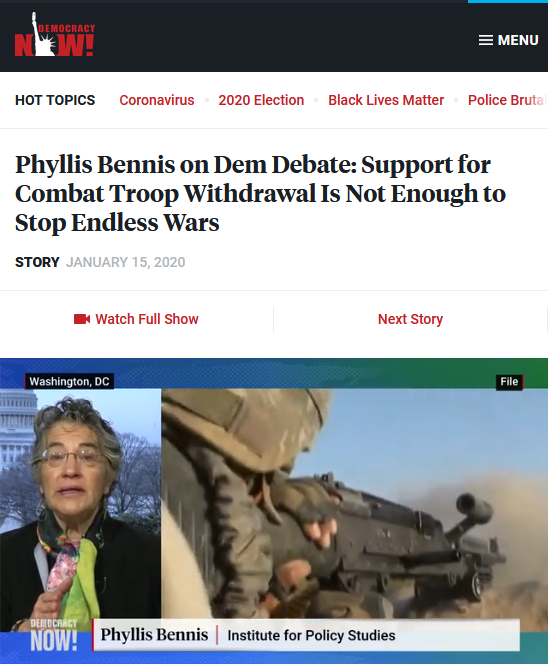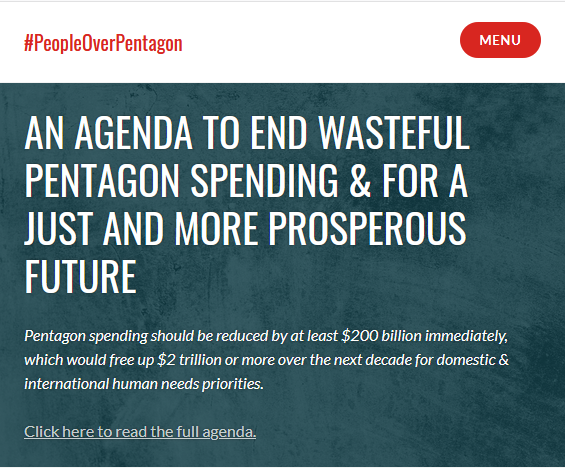Janine Jackson interviewed IPS’s Phyllis Bennis about foreign policy visions for the August 28, 2020, episode of CounterSpin. This is a lightly edited transcript.
Janine Jackson: Describing the Democratic presidential candidates after a debate back in January, our next guest noted that they had “talked some about what it means to be the commander-in-chief,” but not “enough about what it means to be the diplomat-in-chief.” The same might be said for corporate news media, whose assessment of presidential contenders gives foreign policy short shrift generally, and then, as we noticed in the debates, overwhelmingly frame international questions around military intervention.
What’s missing from that truncated conversation, and what does it cost us in terms of global political possibilities? Phyllis Bennis directs the New Internationalism project at the Institute for Policy Studies, and is author of numerous books, including Before & After: US Foreign Policy and the War on Terror and Understanding the Palestinian/Israeli Conflict, now in its 7th updated edition. She joins us by phone from Washington, DC. Welcome back to CounterSpin, Phyllis Bennis.
Phyllis Bennis: Good to be with you.
FAIR.org (8/21/20)
JJ: I want to talk about what a humanistic foreign policy could look like. But first, as I have you here, I’d feel remiss not to ask for your reflections on current events in Gaza and Israel/Palestine. US media aren’t paying a lot of attention to two weeks now of attacks by Israel on the Gaza Strip, and the articles we see are quite formulaic: Israel is retaliating, you know. So what’s the context to help us understand these events?
PB: Yeah. The situation, Janine, in Gaza is as bad as ever and rapidly getting worse—not least because they have now found the first, I think it’s up to seven, community-spread cases of the Covid virus, which, up until now, all the cases in Gaza—and they had been very few, because Gaza has been under essentially a lockdown since 2007—but the cases that came in were all from people coming in from outside, who had been outside and were coming back. Now the first community spread has happened, and it means that the already-devastated healthcare system in Gaza is going to be completely overwhelmed and unable to deal with the crisis.
That problem facing the healthcare system, of course, has been exacerbated in recent days, with the Israeli bombing that has continued, and it included cutting off fuel to Gaza’s sole functioning power plant. That means that the hospitals, and everything else in Gaza, are limited to four hours a day of electricity at the most—some areas have less than that, some have no electricity at all now, at the heart of the hottest time of the Gaza summer—so that people facing any kind of lung diseases are devastated, in terms of their living conditions, and the hospitals can do very little about it. And as more Covid cases happen, that’s going to get worse.
The Israeli bombing—this range of bombing, of course, we know that Israeli bombing of Gaza is something that’s gone back and forth for many years; Israel uses the term “mowing the lawn” to describe its repeating, going back to Gaza to bomb again, to remind the population that they are still living under Israeli occupation—this current round, which has been almost every day since August 6, a little more than two weeks, was partly because the siege of Gaza that Israel had imposed back in 2007 has recently been escalating. So that the fisherfolk were now prohibited from going out to fish at all, which is a huge component of the very, very limited, fragile economy of Gaza. It’s the immediate way people can feed their families and, suddenly, they’re not allowed to go out in their boats. They can’t go fishing at all; they have nothing to feed their families.
The new restrictions on what goes in have now become everything is prohibited, other than certain food items and certain medical items, which are rarely available anyway. Nothing else is allowed in. So the conditions in Gaza are getting really dire, really desperate.
And some young Gazans sent balloons, lighted balloons with little candles, sort of, in the balloons, that have had the effect of causing fires in a few places on the Israeli side of the fence that Israel has used to fence in the entire Gaza Strip, making the 2 million people who live in Gaza essentially prisoners in an open-air prison. It’s one of the most densely populated pieces of land on the Earth. And this is what they’re facing.
And in response to these aerial balloons, the Israeli Air Force has been back, on a daily basis, bombing both what they claim are military targets, such as tunnels, which have been used in the past, there’s no indication of recent use for military purposes, by Hamas and other organizations, but are primarily used for smuggling in things like food and medicine, which can’t get through the Israeli checkpoints.
So in that context, the Israeli escalation is a very, very dangerous one, when people in Gaza are 80% refugees, and of those 80%, 80% are completely dependent on outside aid agencies, the UN and others, for even basic food for survival. This is a population that is so incredibly vulnerable, and that’s who the Israeli military is going after. It’s a horrific situation, and getting worse.
JJ: It seems important to keep that in mind as we read news accounts that say that these are attacks on Hamas, which makes it sound….
PB: The reality is Hamas runs the government, such as it is, in Gaza—the government that has very little power, very little capacity, to do very much to aid people’s lives. But Hamas people are the people of Gaza. They live in the same refugee camps, with their families, as everyone else. So this notion that the Israelis say, “We’re going after Hamas,” claims that it’s somehow a separate army, I suppose, that doesn’t exist in the midst of where people live.
And, of course, the US and the Israelis and others claim that as evidence that Hamas people don’t care about their own population, because they situate themselves in the middle of a civilian population. As if Gaza had space, and choices about where to situate an office or whatever. It just doesn’t pay any attention to the realities on the ground, and how dire conditions are in this incredibly crowded, incredibly impoverished, disempowered community of 2 million people that have no voice outside their own walled-off strip of land.
JJ: Israel/Palestine, and the Middle East more generally, will be just one of the foreign policy issues facing the next US president. Although what issues they need to face is part of the question; many would have the US stop seeing “issues” for itself in other countries around the world. But rather than talk about candidates’ various positions, I wanted to ask you to share a vision, to talk about what a foreign or international engagement that honored human rights, that honored human beings, could look like. What, to you, are some of the key elements of such a policy?

Phyllis Bennis: “Foreign policy has to be grounded in global cooperation, human rights…respect for international law, privileging diplomacy over war.”
PB: What a concept: a foreign policy that is based on human rights—something that we haven’t seen here for a very, very long time. We don’t see it from too many other countries, either, we should be clear, but we live in this country, so it’s particularly important for us. I would say there’s about five components to what that kind of a foreign policy, what the core principles of such a policy, could look like.
No. 1: Reject the notion that US military and economic domination around the world is the raison d’être of having a foreign policy. Instead, understand that foreign policy has to be grounded in global cooperation, human rights, as you said, Janine, respect for international law, privileging diplomacy over war. And real diplomacy, meaning a strategy that says diplomatic engagement is what we do instead of going to war, not to provide political cover to go to war, as the US has so often relied on diplomacy.
And that means a number of changes, very explicit ones. It means recognizing that there is no military solution to terrorism, and therefore we have to end the so-called “Global War on Terror.” Recognize that the militarization of foreign policy in places like Africa, where the Africa Command pretty much controls all of US foreign policy towards Africa—that has to be reversed. Those things together, rejecting military and economic domination, that’s No. 1.
No. 2 means recognizing how what the US has created in a war economy has so distorted our society at home. And that means, commit to changing that by cutting the military budget—massively. The military budget today is about $737 billion; it’s an unfathomable number. And we need that money, certainly, at home. We need it for dealing with the pandemic. We need it for healthcare and education and a Green New Deal. And internationally, we need it for a diplomatic surge, we need it for humanitarian and reconstruction aid, and assistance to people who have already been devastated by US wars and sanctions. We need it for refugees. We need it for Medicare for All. And we need it to change what the Pentagon does, so it stops killing people.
We could start with the 10% cut that Bernie Sanders introduced in Congress; we would support that. We’d support the call from the People over Pentagon campaign, that says we should cut $200 billion, we would support that. And we would support People Over Pentagon that my institute, the Institute for Policy Studies, and the Poor People’s Campaign called for, which is to cut $350 billion, cut half the military budget; we’d still be safer. So all of that is No. 2.
No. 3: Foreign policy has to acknowledge that US actions in the past—military actions, economic actions, climate actions—are very much at the center of what is the driving force displacing people all around the globe. And we have a moral as well as a legal obligation, under international law, to therefore take the lead in providing humanitarian support, and provide refuge for all those displaced people. So it means that immigration and refugee rights have to be central to a human rights–based foreign policy.
No. 4: Recognize that the power of US empire to dominate international relations all around the world has led to the privileging of war over diplomacy, again, all around the world, on a global scale. It has created a vast and invasive network of more than 800 military bases around the world, that are destroying the environment and communities all around the world. And it’s militarized foreign policy. And all of that needs to be reversed. Power should not be the basis for our international relations.
And last, and maybe the most important, and the hardest: foreign policy of this country has to reject US exceptionalism. We have to get over the notion that we are somehow better than everybody else, and therefore we are entitled to whatever we want in the world, to destroy whatever we want in the world, to take whatever we think we need in the world. It means that international military and economic efforts in general, that have been historically aimed at controlling resources, at imposing US domination and control, that that has to end.
And, instead, we need an alternative. We need a new kind of internationalism that’s designed to prevent and to solve crises that rise, well, certainly right now, from the current and potential wars, until we manage to change the foreign policy. We need to promote real nuclear disarmament for everybody, on all sides of the political divides. We have to come up with climate solutions, which is a global problem. We have to deal with poverty as a global problem. We have to deal with protecting refugees as a global problem.
All of these are serious global problems that require a whole different kind of global interaction than we’ve ever had. And that means rejecting the notion that we are exceptional and better and different and the shining city on the hill. We are not shining, we’re not up the hill, and we are creating enormous challenges for people that are living all around the world.
JJ: Vision is so critical. It’s not frivolous at all. It’s so important to have something to look toward, especially at a time when dissatisfaction with the status quo is the only place of agreement for many people.

Democracy Now! (1/15/20)
I only want to ask you, finally, about the role of movements. You said, on Democracy Now! back in January, after that Democratic debate, “these people will only move as far as we push them.” That, if anything, is only more clear, just a few months later. It’s no less true for international affairs than for domestic. Talk just a bit, finally, about the role of people’s movements.
PB: I think we’re talking both principle and particular. The principle is that social movements have always been what make possible progressive social change in this country, and in most countries around the world. That’s not something new and different; that’s been true forever.
What’s particularly true this time around, and this will be true—and I say this not as a partisan, but just as an analyst, looking at where the various parties and various players are—if there were to be a new administration led by Joe Biden, what’s been very clear to analysts looking at his role in the world, is that he believes that his experience in foreign policy is his strong suit. It’s not one of the areas where he’s looking for cooperation and collaboration, with the Bernie Sanders wing of the party, with others. He thinks this is his fiefdom; this is what he knows, this is where he’s strong, this is where he will control. And this is probably the area where the Biden wing of the Democratic Party is the farthest away from the principles held by the progressive wing of the Democratic Party.
There’s been a motion to the left in the Biden wing, on issues around climate, some of the issues around immigration, and those gaps are narrowing. That’s not yet the case on the question of foreign policy. And for that reason, again, beyond the principle that movements are always key, in this case, it’s only the movements that will force—by the power of the vote, the power in the streets, the power to bring pressure to bear on members of Congress; and on the media, and changing the discourse in this country—that will force a new kind of foreign policy to be considered, and ultimately to be implemented in this country. We have a lot of work to do on those kinds of changes. But when we look at what it’s going to take, it’s the question of social movements.

Franklin Roosevelt
There’s the famous line from FDR, when he was putting together what would become the New Deal—before the Green New Deal was envisioned, there was the old, not-so-green New Deal, the somewhat racist New Deal, etc., but it was a very important set of steps forward. And in his discussions with a number of trade union activists, progressive and socialist activists that met with the president: In all of those, what he is known to have said at the end of these meetings is, “OK, I understand what you want me to do. Now go out there and make me do it.”
It was the understanding that he did not have the political capital on his own to simply write a memo and something would magically happen, that there needed to be social movements in the streets demanding what he, by that time, kind of agreed with, but didn’t have the capacity to create by himself. It was the movements that made that possible. We’re going to face situations like that in the future, and we have to do the same thing. It’s social movements that will make change possible.
JJ: We’ve been speaking with Phyllis Bennis, director of the New Internationalism project at the Institute for Policy Studies. They’re online at IPS-DC.org. The 7th updated edition of Understanding the Palestinian/Israeli Conflict is out now from Olive Branch Press. Thank you so much for joining us this week on CounterSpin, Phyllis Bennis.
PB: Thank you, Janine. It’s been a pleasure.
PrintCounterSpin | Radio Free (2020-09-08T18:39:39+00:00) ‘Foreign Policy of This Country Has to Reject US Exceptionalism’. Retrieved from https://www.radiofree.org/2020/09/08/foreign-policy-of-this-country-has-to-reject-us-exceptionalism/
Please log in to upload a file.
There are no updates yet.
Click the Upload button above to add an update.

